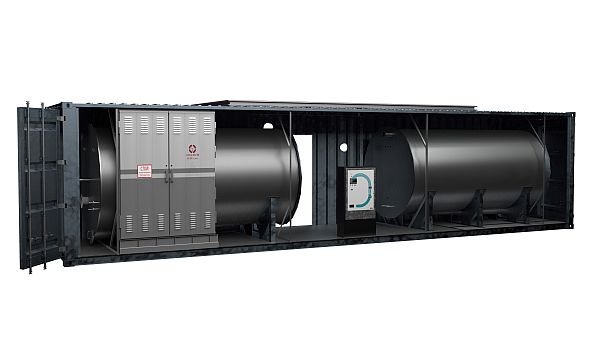RaCBio Technology introduction
Traditional biogas technology cannot decompose the fibrous components (essentially cell walls/ celluloses) off organic or biomass efficiently resulting in low efficiency.
To decompose the “dry” material containing a high percentage of fibrous material, excluding woody material or material containing high volume of lignin, a change of technology is necessary.
The application of an “artificial rumen” as a first process step in which the cell walls are split into sugars that can be converted into short chained fatty acids can be used to solve that problem.
RaCBio’s mechanical cow is specifically developed to produce an “artificial rumen condition” thus it offers a significantly higher gas yield from cellulose rich material than tradition biogas technology.
Looking to nature it can be noted that all ruminant animal (cows etc) consumes large quantities of cellulose rich materials. These materials are converted into protein, water and biogas in a very short space of time, hours rather than days or weeks by the animals.
By back-engineering this process the various step can be isolated allowing bio-methane production and proteins rich material as by-product under very controlled conditions.
Rapid Cellulose Bioreactor or RaCBio (mechanical cow) is a technology specifically develop to achieve just that, it offers:

- Reduced retention time – reduced capital spending
- Capable of handling a very large selection of feedstock
- Much more controllable process
- Produce sulphur free biogas
- By-product is a protein rich substrate and
- Nutrient rich water
Key factor of RaCBio
- Can convert all cellulose and hemi-cellulose material that can be eaten by a ruminant animal (grass, maze, corn, organic municipal waste garden and landscape waste and fesses).
- No need for manures or high-quality feedstock
- Produce sulphur free Bio-methane
- Very short retention time due to selection and rapped conversion process
- Produce protein rich slurry that can be used as an animal feed
Summary
iRCB has developed a second-generation biogas reactor that converts biomass into biomethane gas within 72 hrs. The plant is built into a standard 12 m shipping container and can be transported, assembled, and operated anywhere in the world. The RaCBio system is modular and can be scaled to supply small quantities of biogas or industrial volumes of Renewable Natural Gas. The bio-methane can then be easily converted into electricity or used as transportation or domestic fuel.
Cow dung contains up to 40% cellulose per volume and can be successfully utilised as a “fuel” for producing energy. At your Douglas feedlot significant amount of manure is produce on a constant basis. By pre-processing the material (remove soil and non-organic fractions) the celluloses and hemi-cellulose can be “processed” in the RaCBio system, to produce biomethane, protein rich sludge and process water.
RaCBio offers a commercially viable solution with multiple revenue streams, sustainable jobs, and carbon reduction.
The proposed system will produce electricity 96 c/kWh inclusive of Opex cost, gas at R 7.88/kg LPG equivalent and diesel equivalent at R 6.75/ litre. Note these prices are based on capex Opex for next 15 years
This compared to Eskom cost in 2023 for Landrate2 of 196 c/kWh Gas at R 34/ kg and diesel at R 25/ litre.
Electricity produced via diesel generator = R 8.40/ kWh
Project estimated finical performance
| Turn-over | R 5.4 million/ year |
| Cost of production | R 0.95 million/ year |
| EBIT | R 4.4 million – 82% |
| IRR | 39.7% |
| NPV (20 years) | R 48.,9 million |
| Profitability Index | 3.7times |
